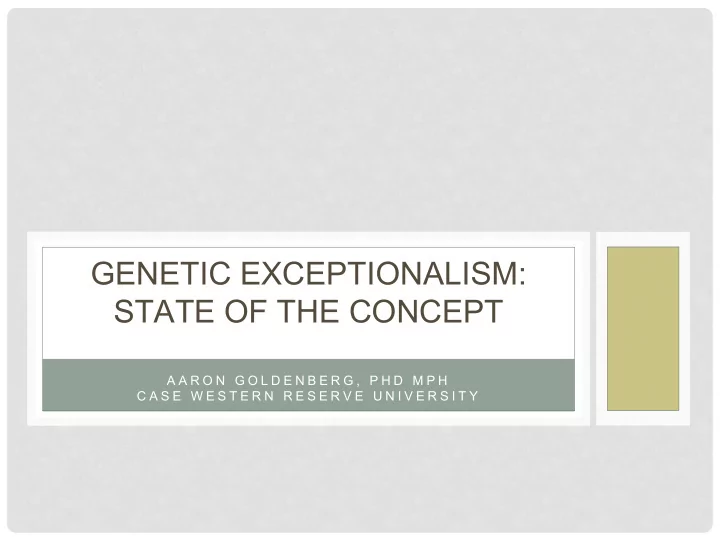

GENETIC EXCEPTIONALISM: STATE OF THE CONCEPT A A R O N G O L D E N B E R G , P H D M P H C A S E W E S T E R N R E S E R V E U N I V E R S I T Y
ORIGINS OF THE CONCEPT • Genetic Exceptionalism: The concept that genetic information is qualitatively different than other types of medical information and therefore needs “special” attention (ex. in policies) • Fears of discrimination or stigmatization • Concept gained momentum in the 90’s as the genetic testing options grew and the human genome project advanced
LEGACY OF GENETIC EXCEPTIONALISM • Genetic Exceptionalism in Policies • Genetic Privacy Legislation • Genetic Exceptionalism in Practice • Genetic testing oversight (ex EGAPP) • Historically genetic information rarely had a large impact on health outcomes • Genetic Exceptionalism in Ethics
CLAIMS VS. REALITY (GREEN/BOTKIN) • Predictive nature of genetic information • Impact of genetic information for families • Use of genetic information to discriminate or stigmatize • Genetic information can cause significant psychological harms
GENETIC EXCEPTIONALISM IN THE GENOMIC ERA • Concerns about “Reverse Genetic Exceptionalism” • Genetic and genomic information in the electronic medical record • McGuire et al/Evans and Burke • eMERGE • Genomic information as a unique identifier • Patient control of information vs. Clinical utility of information for health care providers
GENOMIC EXCEPTIONALISM? • Genomics as the “key” to personalized medicine (James) • Access to sequence information • Issues of privacy and confidentiality remain • Open source data • Added claims • Incidental findings • Variants of unknown significance • Research vs. Practice
THANK YOU • Kyle Brothers • Nanibaa’ Garrison • Center for Genetic Research Ethics & Law (2P50-HG- 003390).
Recommend
More recommend